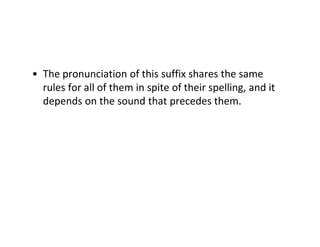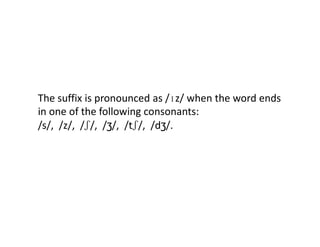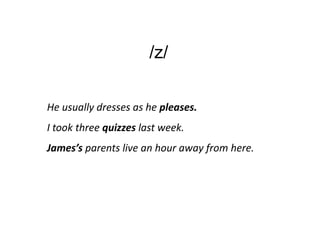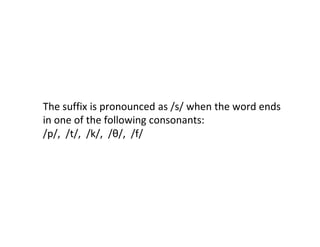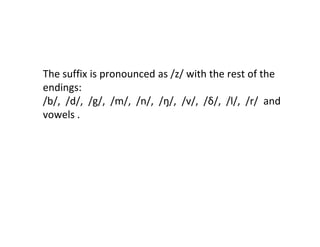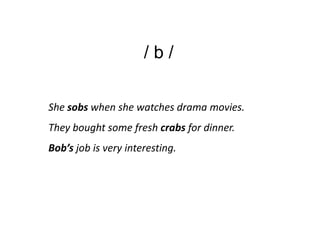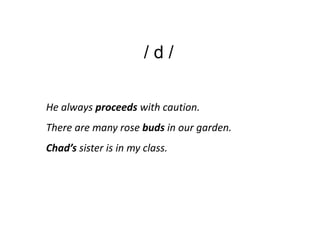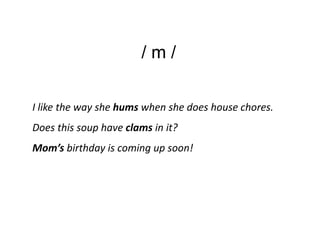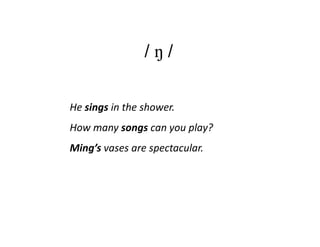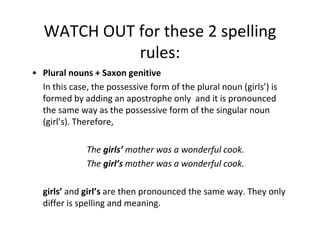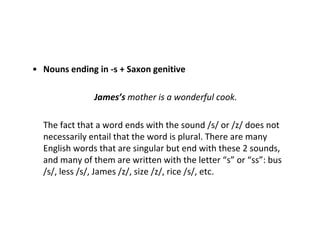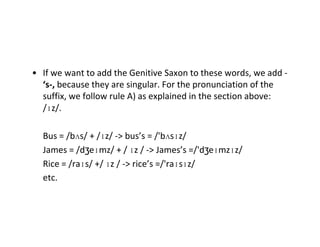Suffix s
- 1. Unit 1: PRONUNCIATION OF THE SUFFIX -s/-es 3rd Person Singular Simple Present, Saxon Genitive and the Plural
- 2. In the section, you are going to learn how to pronounce the suffix âs/-es that you can find in these occasions: âĒ Third person singular verbs (he/she/it) He wakes up at 7am everyday. âĒ Plural nouns We usually buy oranges at the market. âĒ Saxon genitive (possesive) Johnâs house is close to the lake.
- 3. âĒ The pronunciation of this suffix shares the same rules for all of them in spite of their spelling, and it depends on the sound that precedes them.
- 4. The suffix is pronounced as /ÉŠz/ when the word ends in one of the following consonants: /s/, /z/, /Ę/, /Ę/, /tĘ/, /dĘ/.
- 5. /s/ Susan always passes her exams with a good grade. They have two horses in their country house. Jessâs friend is so funny!
- 6. /z/ He usually dresses as he pleases. I took three quizzes last week. Jamesâs parents live an hour away from here.
- 7. /Ę/ Peter never washes his clothes. I wash the dishes sometimes. Have you met Joshâs cousin?
- 8. /Ę/ He massages ten clients per day. We chose two yellows and three beiges for the house. Blancheâs mother is from France.
- 9. / tĘ / She usually watches TV after dinner. Do you have some matches to light the fire? I think I know Mitchâs new friend.
- 10. / dĘ / She often judges other people. The officer wears a lot of badges on his uniform. Margeâs children are very polite.
- 11. The suffix is pronounced as /s/ when the word ends in one of the following consonants: /p/, /t/, /k/, /Îļ/, /f/
- 12. /p/ He keeps a diary as therapy. Laura always leaves tips to the waiters. Kippâs products are the freshest in the market.
- 13. /t/ She usually cuts ham into small pieces for her children. Heâs wearing blue shorts this morning. Peteâs dogs are so lovely.
- 14. /k/ My grandmother cooks great meals. She made some cakes this morning. Are you coming to Markâs party tonight?
- 15. /Îļ/ There are two paths we can take. Keithâs classmates adore him.
- 16. /f/ She always laughs at his jokes. These pants lack cuffs and pockets. We are studying the wolf's anatomy.
- 17. The suffix is pronounced as /z/ with the rest of the endings: /b/, /d/, /g/, /m/, /n/, /Å/, /v/, /Îī/, /l/, /r/ and vowels .
- 18. /b/ She sobs when she watches drama movies. They bought some fresh crabs for dinner. Bobâs job is very interesting.
- 19. /d/ He always proceeds with caution. There are many rose buds in our garden. Chadâs sister is in my class.
- 20. /g/ I donât know how he always clogs the toilet. Put the bags in the kitchen, please. Dougâs hair is getting thinner.
- 21. /m/ I like the way she hums when she does house chores. Does this soup have clams in it? Momâs birthday is coming up soon!
- 22. /n/ She runs eight miles every day. There are tons of people waiting outside. Johnâs barbecue is this weekend.
- 23. /Å/ He sings in the shower. How many songs can you play? Mingâs vases are spectacular.
- 24. /v/ Helen leaves for Turkey on Monday. Be careful with the knives on the table. Vivâs husband travels every month.
- 25. /Îī/ She bathes her baby very carefully.
- 26. /l/ Elliot travels frequently. Do you know how many malls we have in this city? Jillâs representative works very efficiently.
- 27. /r/ She transfers money early in the morning. They have some scars from their accident. The directorâs assistants work more than anyone else.
- 28. vowels I donât know where he goes every afternoon. They opened two more cafÃĐs at the mall. Carlaâs car is better that yours.
- 29. WATCH OUT for these 2 spelling rules: âĒ Plural nouns + Saxon genitive In this case, the possessive form of the plural noun (girlsâ) is formed by adding an apostrophe only and it is pronounced the same way as the possessive form of the singular noun (girlâs). Therefore, The girlsâ mother was a wonderful cook. The girlâs mother was a wonderful cook. girlsâ and girlâs are then pronounced the same way. They only differ is spelling and meaning.
- 30. âĒ Nouns ending in -s + Saxon genitive Jamesâs mother is a wonderful cook. The fact that a word ends with the sound /s/ or /z/ does not necessarily entail that the word is plural. There are many English words that are singular but end with these 2 sounds, and many of them are written with the letter âsâ or âssâ: bus /s/, less /s/, James /z/, size /z/, rice /s/, etc.
- 31. âĒ If we want to add the Genitive Saxon to these words, we add - âs-, because they are singular. For the pronunciation of the suffix, we follow rule A) as explained in the section above: /ÉŠz/. Bus = /bĘs/ + /ÉŠz/ -> busâs = /'bĘsÉŠz/ James = /dĘeÉŠmz/ + / ÉŠz / -> Jamesâs =/'dĘeÉŠmzÉŠz/ Rice = /raÉŠs/ +/ ÉŠz / -> riceâs =/'raÉŠsÉŠz/ etc.


